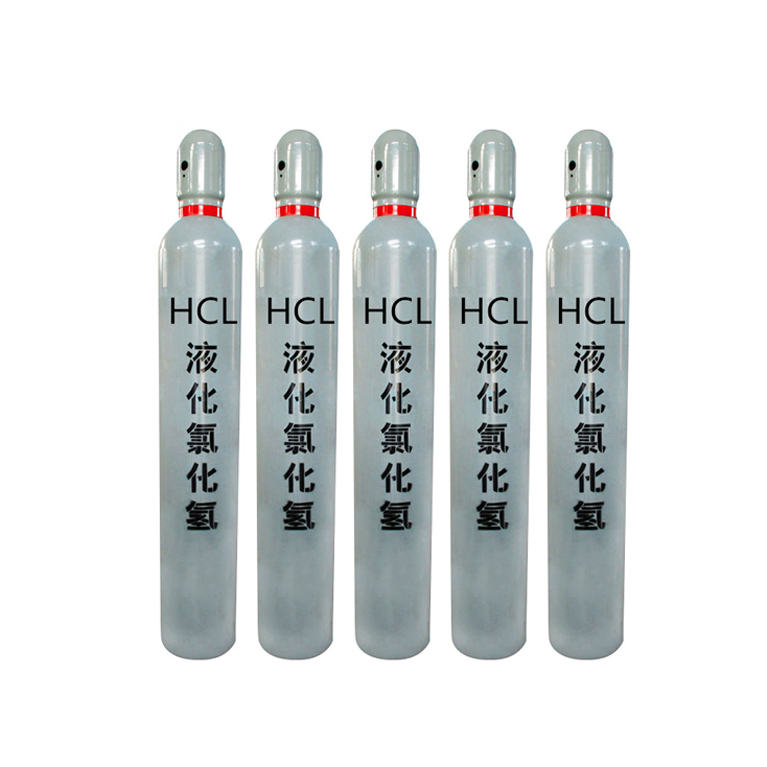
CAS No.: 7647-01-0
EINECS No.: 231-595-7
UN No.: UN1050
Purity: 99.9%, 99.999%
Dot Class: 2.3
Appearance: Colorless
Grade Standard: Chemical Grade; Electronic Grade
What hydrogen chloride?
Hydrogen chloride, is a colorless non-flammable gas, has a very irritating odor, the specific gravity is greater than air, in the case of humid air to produce white fog, easily soluble in water, the generation of hydrochloric acid. It is highly corrosive, can react with a variety of metals to produce hydrogen, can form an explosive mixture with air, and produce highly toxic hydrogen cyanide in case of cyanide.
Hydrogen chloride is a colorless gas with a pungent odor. Concentrated hydrochloric acid is a colorless liquid, it is packed in a bottle, and after a while the bottle mouth will produce white fog (because hydrochloric acid is highly volatile, white fog is hydrochloric acid droplets produced by the combination of hydrogen chloride volatilization and water vapor in the air), with pungent and sour taste. Industrial hydrochloric acid has a yellow tinge due to the presence of ferric salts. It is easily soluble in water, at 0 ° C, 1 volume of water can dissolve about 500 volumes of hydrogen chloride. The aqueous solution of hydrogen chloride is acidic, called hydrochloric acid, which is a strong acid and is habitually called hydrochloric acid. Mainly used in the production of dyes, spices, drugs, various chlorides and corrosion inhibitors. Hydrochloric acid is an aqueous solution of hydrogen chloride, which is colorless or slightly yellow liquid and is volatile.
What harm does hydrogen chloride produce to the human body?
Health hazard: Hydrogen chloride gas has a strong irritating effect on the eyes and respiratory mucosa.
Acute poisoning: headache, dizziness, nausea, eye pain, cough, blood in sputum, hoarseness, dyspnea, chest tightness, chest pain, etc. Pneumonia, pulmonary edema and atelectasis occurred in severe cases. Corneas may be ulcerated or cloudy. Direct skin contact can appear a large number of miliary red papules with hot flushing pain.
Chronic effects: Long-term exposure to high concentrations can cause chronic bronchitis, gastrointestinal dysfunction and dental acidosis.
Symptoms caused by the local action of hydrogen chloride include conjunctivitis, corneal necrosis, damage to the skin and mucous membranes, resulting in severe painful burns. After inhalation, it causes rhinitis, nasal septum perforation, tooth erosion, laryngitis, bronchitis, pneumonia, headache and heart palpitations, and a sense of suffocation. When swallowed, it can irritate the mouth, throat, esophagus and stomach, causing salivation, nausea, vomiting, intestinal perforation, chills and fever, restlessness, shock and nephritis. Long-term exposure to low concentration hydrogen chloride can make the skin dry and earthy, and can also cause cough, headache, insomnia, dyspnea, palpitation, stomach pain and other conditions. The most obvious symptom of chronic poisoning is that the surface of the teeth becomes rough, especially the front teeth develop spots.
Explosion hazard: Hydrogen chloride is a non-flammable gas, but in contact with active metal powder, it will react to produce hydrogen and chloride. As hydrogen is produced, there is a danger of explosion and fire. Cylinders filled with hydrogen chloride, in case of open fire or high temperature, the internal pressure will increase and there is a risk of bursting.
Pollution source
Hydrogen chloride can be synthesized directly from chlorine and hydrogen, or chlorine and water vapor can be produced by burning coke. Hydrogen chloride is mainly used to prepare standard solution for titrating alkaline substances. Adjust the pH of the solution; Hydrolyzed starch and protein; Preparation of chlorides, gels, pharmaceuticals and dyes; Organic synthesis catalyst, solvent, etchant; Manufacture of dyes, fragrances, medicines, various chlorides and corrosion inhibitors; Manufacture of barium chloride, ammonium chloride, etc., in the laboratory, metallurgy, dye manufacturing, leather tanning and dyeing, textile and related chemical production often appear.
How to prevent hydrogen chloride poisoning?
Provide adequate local exhaust and full ventilation.
Strengthen safety education and strictly abide by operation procedures to prevent accidents.
Equipment should be closed, frequent maintenance, to prevent running, bubbling, dripping, leakage phenomenon.
When the concentration in the air exceeds the standard, wear a filter gas mask.
Install on-line hydrogen chloride probe to monitor toxic gas leakage in real time.
During emergency rescue or evacuation, it is recommended to wear an air respirator.
After work, shower and change clothes. Maintain good hygiene.
Emergency measure
Leakage: Quickly evacuate the contaminated area of the leak to the safety zone (escape to the height, because of the high density of HCl), and isolation, strictly restrict access. It is recommended that emergency personnel wear self-contained positive pressure breathing apparatus and acid-alkali protective overalls. Do not contact spills directly. Cut off the source of leakage as much as possible to prevent entering the sewer, flood drainage ditch and other restricted Spaces.
Small leakage: Mix with sand, dry lime or soda ash. It can also be washed with a large amount of water and diluted into the waste water system.
Massive leakage: build a embankment or dig a pit to contain; Transfer by pump to tank or special collector, recycling or transport to waste disposal site disposal.
Inhalation: Quickly remove from the scene to fresh air. Keep your airway clear. Administer oxygen if breathing is difficult. If breathing stops, give artificial respiration immediately. Seek medical attention.
Ingestion: If ingested by mistake, gargle with water, drink milk or egg white, and seek medical attention in time.
Skin contact: Immediately remove contaminated clothing, rinse with plenty of running water for at least 15 minutes, and seek medical attention.
Eye contact: Lift eyelids immediately, rinse thoroughly with plenty of running water or saline for at least 15 minutes, and seek medical attention immediately.
Founded in 2015, Zibo Dijia Special Gas Co., Ltd A is committed to becoming a professional special gas production and marketing enterprise in the world. Dijia has full range of specialty gases, including electronic gases, high purity gases, mixed gases, electric lighting gases, ultra-pure gases, laser gases, medical gases, calibration gases, a total of ten series of more than 100 varieties, with strong market competitiveness. In addition, the company has a strong r&d and design team, which can provide technical output services for environmental protection, gas recovery and resource utilization
projects.
Any demands,pls contact us!
Chat Online








